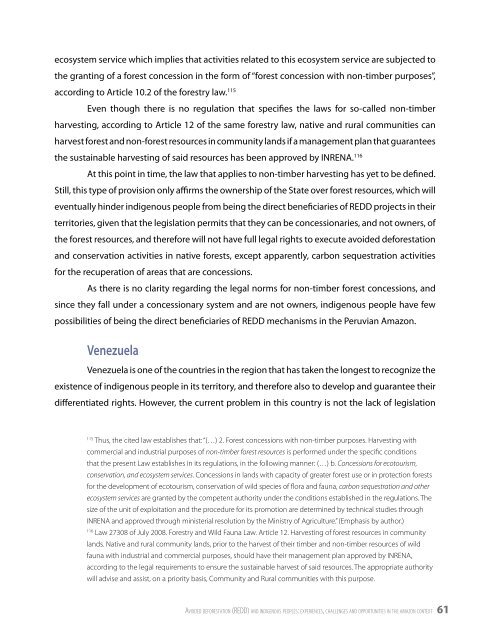Avoided Deforestation (REDD) and Indigenous ... - Amazon Fund
Avoided Deforestation (REDD) and Indigenous ... - Amazon Fund
Avoided Deforestation (REDD) and Indigenous ... - Amazon Fund
Create successful ePaper yourself
Turn your PDF publications into a flip-book with our unique Google optimized e-Paper software.
ecosystem service which implies that activities related to this ecosystem service are subjected to<br />
the granting of a forest concession in the form of “forest concession with non-timber purposes”,<br />
according to Article 10.2 of the forestry law. 115<br />
Even though there is no regulation that specifies the laws for so-called non-timber<br />
harvesting, according to Article 12 of the same forestry law, native <strong>and</strong> rural communities can<br />
harvest forest <strong>and</strong> non-forest resources in community l<strong>and</strong>s if a management plan that guarantees<br />
the sustainable harvesting of said resources has been approved by INRENA. 116<br />
At this point in time, the law that applies to non-timber harvesting has yet to be defined.<br />
Still, this type of provision only affirms the ownership of the State over forest resources, which will<br />
eventually hinder indigenous people from being the direct beneficiaries of <strong>REDD</strong> projects in their<br />
territories, given that the legislation permits that they can be concessionaries, <strong>and</strong> not owners, of<br />
the forest resources, <strong>and</strong> therefore will not have full legal rights to execute avoided deforestation<br />
<strong>and</strong> conservation activities in native forests, except apparently, carbon sequestration activities<br />
for the recuperation of areas that are concessions.<br />
As there is no clarity regarding the legal norms for non-timber forest concessions, <strong>and</strong><br />
since they fall under a concessionary system <strong>and</strong> are not owners, indigenous people have few<br />
possibilities of being the direct beneficiaries of <strong>REDD</strong> mechanisms in the Peruvian <strong>Amazon</strong>.<br />
Venezuela<br />
Venezuela is one of the countries in the region that has taken the longest to recognize the<br />
existence of indigenous people in its territory, <strong>and</strong> therefore also to develop <strong>and</strong> guarantee their<br />
differentiated rights. However, the current problem in this country is not the lack of legislation<br />
115 Thus, the cited law establishes that: “(…) 2. Forest concessions with non-timber purposes. Harvesting with<br />
commercial <strong>and</strong> industrial purposes of non-timber forest resources is performed under the specific conditions<br />
that the present Law establishes in its regulations, in the following manner: (…) b. Concessions for ecotourism,<br />
conservation, <strong>and</strong> ecosystem services. Concessions in l<strong>and</strong>s with capacity of greater forest use or in protection forests<br />
for the development of ecotourism, conservation of wild species of flora <strong>and</strong> fauna, carbon sequestration <strong>and</strong> other<br />
ecosystem services are granted by the competent authority under the conditions established in the regulations. The<br />
size of the unit of exploitation <strong>and</strong> the procedure for its promotion are determined by technical studies through<br />
INRENA <strong>and</strong> approved through ministerial resolution by the Ministry of Agriculture.” (Emphasis by author.)<br />
116 Law 27308 of July 2008. Forestry <strong>and</strong> Wild Fauna Law. Article 12. Harvesting of forest resources in community<br />
l<strong>and</strong>s. Native <strong>and</strong> rural community l<strong>and</strong>s, prior to the harvest of their timber <strong>and</strong> non-timber resources of wild<br />
fauna with industrial <strong>and</strong> commercial purposes, should have their management plan approved by INRENA,<br />
according to the legal requirements to ensure the sustainable harvest of said resources. The appropriate authority<br />
will advise <strong>and</strong> assist, on a priority basis, Community <strong>and</strong> Rural communities with this purpose.<br />
Av o i d e d d e f o re s t A t i o n (redd) A n d i n d i g e n o u s p e o p l e s: experiences, chAllenges A n d o p p o r t u n i t i e s in t h e A m A zo n c o n t e x t 61
















